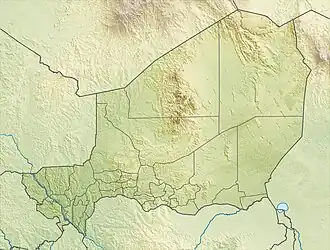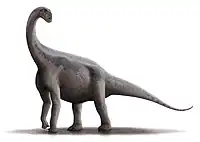Tiourarén Formation
The Tiourarén Formation is a geological formation in the Agadez Region of Niger whose strata were originally thought to be Early Cretaceous. However, re-interpretation of the sediments showed that they are probably Middle-Late Jurassic (Bathonian-Oxfordian) in age.[1][2] It is the uppermost unit of the Irhazer Group. Dinosaur remains are among the fossils that have been recovered from the formation.[3]
| Tiourarén Formation | |
|---|---|
| Stratigraphic range: | |
| Type | Geological formation |
| Unit of | Irhazer Group |
| Underlies | Tazolé Formation (Tegama Group) |
| Overlies | Irhazer Shale |
| Thickness | ~350 m (1,150 ft) |
| Lithology | |
| Primary | Siltstone, mudstone |
| Other | Sandstone, marl, limestone |
| Location | |
| Coordinates | 16.5°N 7.8°E |
| Approximate paleocoordinates | 8.2°N 2.5°E |
| Region | Agadez |
| Country | |
| Extent | Iullemmeden Basin |
| Type section | |
| Named for | Tiourarén hill, Agadez |
 Tiourarén Formation (Niger) | |
Description
The formation comprises reddish, almost solid mudstones, which also shows grey and white streaks, probably caused by alternating oxidative and reducing environments. The depositional environment has been interpreted as swampy with seasonal flooding in braided river systems.[2]
Fossil content
| Dinosaurs | ||||||
|---|---|---|---|---|---|---|
| Genus | Species | Location | Stratigraphic position | Material | Notes | Images |
| Afrovenator[3][4] | A. abakensis[3] | Partial skull and associated postcranial remains.[5] |  | |||
| Jobaria[3] | J. tiguidensis[3] | "Skull [and] several skeletons."[6] |  | |||
| "Rebbachisaurus"[4] | "R." tamesnensis[4] | "Fragmentary remains". | ||||
| Spinostropheus[3] | S. gautieri[3] | "Partial post-cranial skeletons". |  | |||
| Basal Thyreophoran[7] | Unnamed | "associated, but disarticulated, bones, teeth, and abundant scutes from many individuals ranging in maturity from subadult to adult" | ||||
See also
References
- Rauhut and Lopez-Arbarello (2009). "Considerations on the age of the Tiouaren Formation (Iullemmeden Basin, Niger, Africa): Implications for Gondwanan Mesozoic terrestrial vertebrate faunas." Palaeogeography, Palaeoclimatology, Palaeoecology, 271: 259-267.
- Tuiguidit foreland at Fossilworks.org
- Weishampel, David B; et al. (2004). "Dinosaur distribution (Early Cretaceous, Africa)." In: Weishampel, David B.; Dodson, Peter; and Osmólska, Halszka (eds.): The Dinosauria, 2nd, Berkeley: University of California Press. Pp. 571-573. ISBN 0-520-24209-2.
- Sereno, P.C.; Wilson, J.A.; Larsson, H.C.; Dutheil, D.B.; Sues, H.D. (1994). "Early cretaceous dinosaurs from the Sahara". Science. 266 (5183): 267–271. doi:10.1126/science.266.5183.267. PMID 17771449. S2CID 36090994.
- "Table 4.1," in Weishampel, et al. (2004). Page 72.
- "Table 13.1," in Weishampel, et al. (2004). Page 265.
- Ridgwell, Nicole; Sereno, Paul (2010). "A basal Thyreophoran (Dinosauria, Ornithischia) from the Tiouraren Formation of Niger". 70th anniversary meeting of the Society of Vertebrate Paleontology, Program and Abstracts. Society of Vertebrate Paleontology: 150A–151A.
Further reading
- A. F. d. Lapparent. 1960. Les Dinosauriens du "Continental intercalaire" du Saharal central [The dinosaurs of the "Continental Intercalaire" of the central Sahara]. Mémoires de la Société géologique de France, nouvelle série 39(88A):1-57
- P. C. Sereno, A. L. Beck, D. B. Dutheil, H. C. E. Larsson, G. H. Lyon, B. Moussa, R. W. Sadleir, C. A. Sidor, D. J. Varricchio, G. P. Wilson, and J. A. Wilson. 1999. Cretaceous sauropods from the Sahara and the uneven rate of skeletal evolution among dinosaurs. Science 286:1342-1347
- P. C. Sereno, J. A. Wilson, H. C. E. Larsson, D. B. Dutheil, and H.-D. Sues. 1994. Early Cretaceous dinosaurs from the Sahara. Science 266(5183):267-271
- F. Witzmann, O. Hampe, B. M. Rothschild, U. Joger, R. Kosma, D. Schwarz, and P. Asbach. 2016. Subchondral cysts at synovial vertebral joints as analogies of Schmorl's Nodes in a sauropod dinosaur from Niger. Journal of Vertebrate Paleontology 36(2):e1080719:1-11
This article is issued from Wikipedia. The text is licensed under Creative Commons - Attribution - Sharealike. Additional terms may apply for the media files.